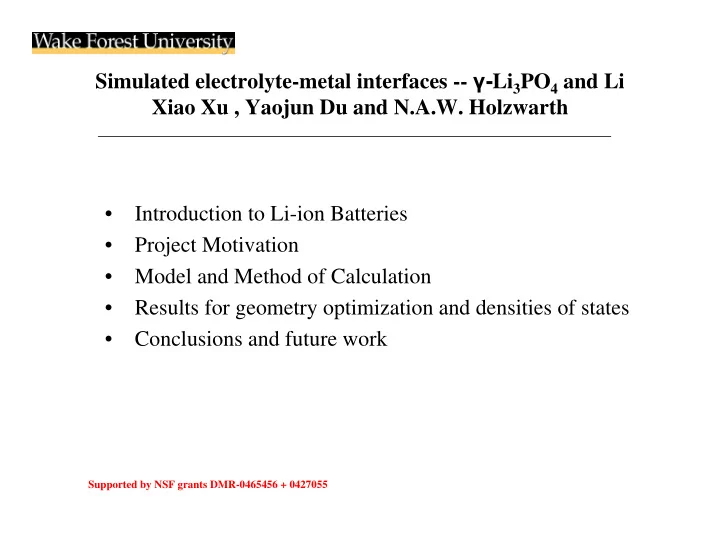

Simulated electrolyte-metal interfaces -- γ - Li 3 PO 4 and Li Xiao Xu , Yaojun Du and N.A.W. Holzwarth • Introduction to Li-ion Batteries • Project Motivation • Model and Method of Calculation • Results for geometry optimization and densities of states • Conclusions and future work Supported by NSF grants DMR-0465456 + 0427055
Discharge operation of Li ion battery Anode Cathode Electrolyte Li + e −
Li ion battery components Store Li + ions and electrons Cathode materials Old technology: LiCoO 2 in discharge mode LiMn 2 O 4 LiNiO 2 New technology : LiFePO4 Transport Li + ions Electrolyte Liquid solvent , gel, polymer And LiPF 6 or LiClO 4 Exclude electrons materials Solid : LiPON , γ -Li 3 PO 4 Anode materials Li Al alloy provide source of Li+ ions Li intercalated graphite Make stable interface and electrons in discharge mode. Metal Li
This talk : What the interface would look like ? Anode Cathode Electrolyte Li + e −
Next talk : How Li would migrate with in the electrolyte Anode Cathode Electrolyte Li + e −
Motivation & Questions • Motivation LiPON 1 And Li 3 PO 4 – Li Li 3 PO 4 vacuum – Why crystal ? • Questions – What are the possible structures of an ideal Li 3 PO 4 – Li metal interface – Are the interfaces physically and chemically stable ? 1 LiPON materials are developed at Oak Ridge National Lab
Model & Method Of Calculation Model Started with ideal γ -Li 3 PO 4 crystal • • Constructed an ideal surface plane, assuming charge neutrality and keep all PO 4 bonds. • Relax surface in vacuum • Deposit a few layers of Li between electrolyte surface and vacuum • Relax the structure Li 3 PO 4 Li 3 PO 4 Li 3 PO 4 Li vacuum vacuum Method of Caculation Plan wave basis with soft pseudo potentials and PAW (PWscf 1 code and PWPAW 2 code ) • |k + K| 2 ≦ 30 Ryd • Atomic positions relaxed until force components less than 3 × 10 -4 Ry/Bohr • 1 www.pwscf.org 2 pwpaw.wfu.edu
Crystal structure of γ - Li 3 PO 4 (Pnma) 2c 2b a
Pure Crystal Partial DOS
Li γ - Li 3 PO 4 interface a-direction Converged structure of Relaxed Structure of γ -Li 3 PO 4 with Li- γ -Li 3 PO 4 interface vacuum 2b 2c a
Interface a-direction Partial Density Of States
Interface a-direction Partial Density Of States
Interface a-direction Partial Density Of States
Li-Li 3 PO 4 interface b-direction Relaxed Structure of γ -Li 3 PO 4 with vacuum 2b 2c a
Interface b-direction Partial Density Of States
Interface b-direction Partial Density Of States
Interface b-direction Partial Density Of States
Li-Li 3 PO 4 interface c-direction 2b 2a 2c
Interface c-direction Partial Density Of States
Interface c-direction Partial Density Of States
Interface c-direction Partial Density Of States
Comparing Pure Crystal with Interface
Simplified DOS model Strong interaction DOS Pure crystal Metallic Li DOS DOS E + Or E E Our results Weak interaction DOS E
Conclusion and future work • We constructed 3 different interfaces on a , b and c planes, with Li metal on Li 3 PO 4 • We found plausible structures with well-defined electrolyte boundary • From the Partial DOS plots, we found an energy gap between electrolyte and metal states. • On the presence of Li metal, electrolyte is physically and chemically stable. • We plan to study Li-ion diffusion across these interfaces
Other possible structures two a-direction interfaces
Other possible structures two b-direction interfaces
Recommend
More recommend